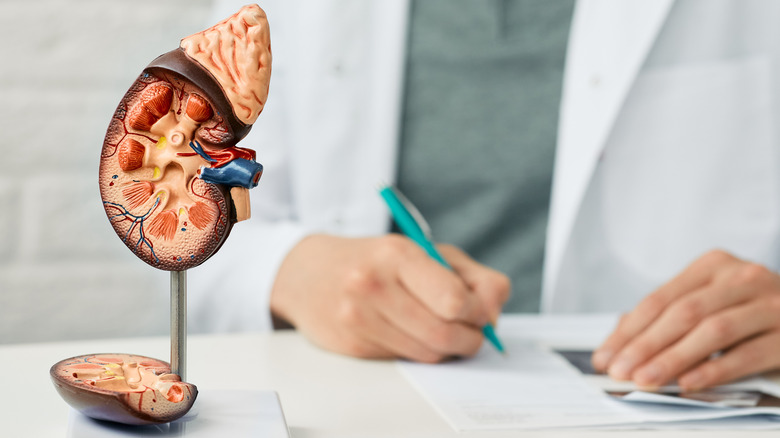Symptoms Of Kidney Stones You Shouldn't Ignore
If you've ever had the misfortune to develop kidney stones, also known as renal calculi, you know they are one of the most painful conditions out there. According to the National Kidney Foundation, it is estimated that over half a million people visit the emergency room each year because of kidney stones, and they estimate one in ten people will develop a stone at some point in their life.
So just what are these painful pebbles? Kidney stones are hardened deposits of minerals and salts which accumulate and form in the kidneys (via National Institutes of Health). The most common type of stones are made up of either calcium oxalate or calcium phosphate, but other forms exist as well, such as uric acid, struvite, and cysteine stones.
Genetics, obesity, diets that are high in oxalates, insufficient water intake, and other medical conditions are just some of the factors that can increase the chance of developing kidney stones (via Mayo Clinic). The risk is also higher in men: approximately 11% of men will develop kidney stones, as opposed to 9% of women. Kidney stones can form suddenly or gradually, so it's important to be aware of the symptoms and know when to seek medical attention.
Know when to seek medical attention for kidney stones
Most kidney stones will not cause symptoms until they have moved through the kidneys and into the ureters, the tubes connecting the kidneys to the bladder (via Mayo Clinic). If the stones are large or oddly shaped they can become lodged in the ureters, making it difficult for urine to pass through. This can lead to severe flank (side) pain, waxing and waning discomfort, nausea, vomiting, and urination that is painful, bloody, or even foul-smelling. Fever and chills are also common. If some or all of these symptoms occur, it is important to seek medical treatment right away.
Treatment of kidney stones varies depending on the size, location, and type. Often medical providers will allow the stones to pass on their own, and encourage adequate hydration and pain medicine. If the stones are causing concerning blockages, however, a non-invasive surgery like shock-wave lithotripsy may be an option (via the National Kidney Foundation). Other surgical treatment options are also available.
To help your chances of keeping kidney stones at bay, it is important to drink plenty of water on a regular basis. While there is no set-in-stone recommendation on water intake, the more you can drink, the better — especially during the hotter months and with increased activity.

